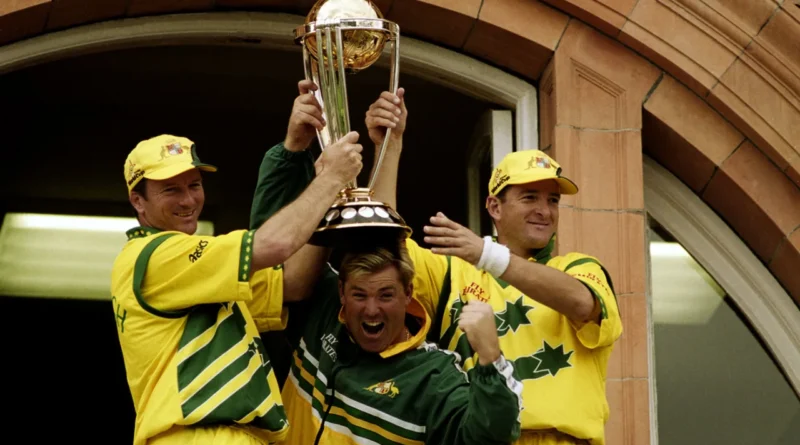The 1999 Cricket World Cup: Glorious Triumph of Australia
What is the Cricket World Cup?
The Cricket World Cup is the premier international championship of One Day International (ODI) cricket, organized by the International Cricket Council (ICC). It is held every four years; it brings teams from around the globe together to compete for the title of world champions.
The tournament’s format has evolved over the years, but it typically involves group stages, knockout rounds, and a final. The inaugural Cricket World Cup took place in 1975 in England, marking the beginning of a storied tradition that has produced some of the most memorable moments in the sport’s history.

The 1999 Cricket World Cup: Overview
The 1999 Cricket World Cup, hosted by England from May 14 to June 20, was a tournament that showcased thrilling cricketing action, dramatic moments, and memorable performances. This edition of the World Cup, the seventh in history, brought together 12 teams competing for the prestigious title.
The tournament was notable for its competitive spirit, exciting matches, and the ultimate triumph of Australia, who lifted the trophy after a dramatic final against Pakistan. Let’s look closer at the key matches, standout performances, and statistical highlights of the 1999 World Cup campaign.
Statistical Highlights of the 1999 Cricket World Cup:
1. Leading Run-Scorers:
The 1999 World Cup saw several batsmen making significant contributions. The leading run-scorers of the tournament were:
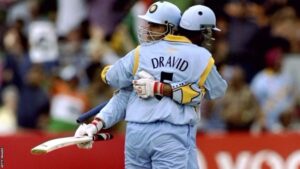
- Rahul Dravid (India) – 461 runs at an average of 65.85, including two centuries.
- Steve Waugh (Australia) – 398 runs at an average of 79.60, including a match-winning century against South Africa.
- Sourav Ganguly (India) – 379 runs at an average of 54.14, including a memorable 183 against Sri Lanka.
2. Leading Wicket-Takers:
Bowlers played a crucial role in the 1999 World Cup, with several outstanding performances. The leading wicket-takers were:

- Geoff Allott (New Zealand) – 20 wickets at an average of 16.25, showcasing consistent wicket-taking ability.
- Shane Warne (Australia) – 20 wickets at an average of 18.05, playing a key role in Australia’s World Cup victory.
- Glenn McGrath (Australia) – 18 wickets at an average of 20.38, providing crucial breakthroughs for his team.
3. All-Round Performances:
All-rounders are often a cricket team’s unsung heroes, contributing with the bat and ball. The 1999 World Cup was no exception, with several all-rounders making significant impacts.
- Jacques Kallis (South Africa) – Jacques Kallis was one of the standout all-rounders of the tournament. He scored 312 runs at an average of 52.00 and took 8 wickets at an economy rate of 3.93. His all-round contributions were pivotal in South Africa’s strong showing in the group stage. Kallis’s consistency and ability to perform under pressure made him a key player for his team.
- Lance Klusener (South Africa) – Lance Klusener was named Player of the Tournament for his exceptional performances. He scored 281 runs at an astounding average of 140.50 and a strike rate of 122.17. Klusener also took 17 wickets at an average of 20.58. His explosive batting in the death overs and ability to take crucial wickets made him an invaluable asset for South Africa

- Shaun Pollock (South Africa) – Shaun Pollock was another vital all-rounder for South Africa. He took 9 wickets at an economy rate of 3.36 and scored 107 runs. Pollock’s ability to swing the ball and his useful lower-order batting made him a crucial player for South Africa, especially in tight situations.
- Chris Cairns (New Zealand) – Chris Cairns was a key all-rounder for New Zealand. He scored 164 runs at an average of 41.00 and took 6 wickets. Cairns’s powerful hitting and ability to take important wickets provided balance to the New Zealand side, making him a significant contributor to their campaign.
Memorable Performances by Teams:
- India’s Dominance Against Sri Lanka – One of the most memorable team performances was India’s dominant victory over Sri Lanka at Taunton on May 26. India posted a massive total of 373/6, thanks to a record-breaking partnership between Sourav Ganguly and Rahul Dravid. Ganguly scored 183, while Dravid contributed 145. Sri Lanka could only manage 216 in reply, giving India a comprehensive victory by 157 runs.
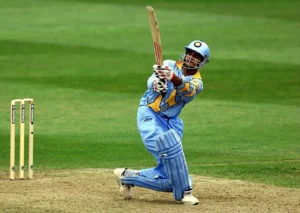
- South Africa’s Group Stage performance – South Africa was the standout team in the group stage, winning four out of their five matches. Their comprehensive victories included a dominant win over England at The Oval, where Lance Klusener’s 48 runs and a disciplined bowling spell led them to a comfortable victory. South Africa’s all-round strength and consistent performances made them one of the favorites for the title.
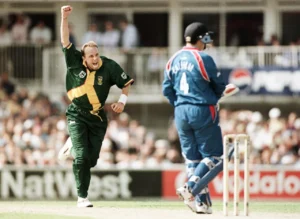
- Pakistan’s Commanding Semi-Final Win – Pakistan’s performance in the semi-final against New Zealand was another highlight. After restricting New Zealand to 241, Pakistan chased down the target with ease, thanks to Saeed Anwar’s 113* and contributions from other top-order batsmen. Pakistan’s clinical performance ensured their place in the final, showcasing their strength as a formidable unit.
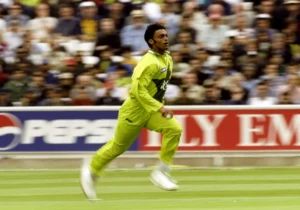
The Champions: Australia’s Triumph
Australia’s journey to the 1999 World Cup title was marked by resilience, skill, and strategic brilliance. Australia bounced back strongly after a shaky start in the group stage, where they lost two matches. Under the astute leadership of Steve Waugh, they regrouped and demonstrated why they were considered one of the strongest teams in the world.
- Group Stage Challenges – Australia’s campaign began with a win against Scotland and then they lost to New Zealand, where they scored 213. Their other defeat came against Pakistan. However, their victories against Bangladesh and the West Indies ensured their progression to the Super Six stage.
- Super Six Stage Comeback – In the Super Six stage, Australia faced a must-win situation against South Africa. In a match that would become legendary, Steve Waugh’s unbeaten 120 guided Australia to a thrilling victory. This match kept Australia in the tournament and boosted their morale and belief.
- The Semi-Final Drama – The semi-final against South Africa at Birmingham was a nail-biter. Chasing 213, South Africa seemed on the verge of victory, but Shane Warne’s magical spell of 4/29 and a dramatic final over resulted in a tie. This tie, thanks to Australia’s superior net run rate, saw them through to the final.
- The Final Dominance – In the final against Pakistan, Australia was at their clinical best. Shane Warne’s 4/33 and Adam Gilchrist’s smashed 54 off 36 balls ensured a comprehensive 8-wicket victory. Australia’s bowlers dismantled Pakistan for 132, and their batsmen chased the target in just 20.1 overs.
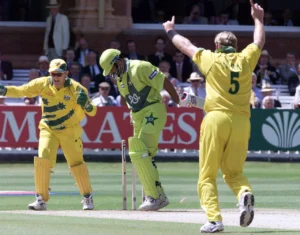
Key Players and Performances:
- Shane Warne: The leg-spinner was the standout bowler of the tournament, with 20 wickets at an average of 18.05. His performances in the semi-final and final were pivotal.
- Steve Waugh: The captain led from the front, scoring crucial runs and making strategic decisions that turned games in Australia’s Favor.
- Adam Gilchrist: His explosive batting at the top of the order provided Australia with quick starts, as seen in the final.
- Glenn McGrath: The pacer’s ability to take early wickets and contain runs was instrumental in several victories.
Conclusion:
The 1999 Cricket World Cup was a tournament that provided cricket fans with numerous memorable moments, thrilling matches, and outstanding individual performances. Australia’s triumph was a testament to their resilience and skill, while teams like South Africa, Pakistan, and India also showcased their cricketing prowess.
The tournament will be remembered for its competitive spirit, dramatic encounters, and the emergence of new cricketing heroes. As we look back on the 1999 World Cup, it stands out as a classic example of why cricket is known as the “gentleman’s game,” filled with excitement, unpredictability, and sportsmanship.
